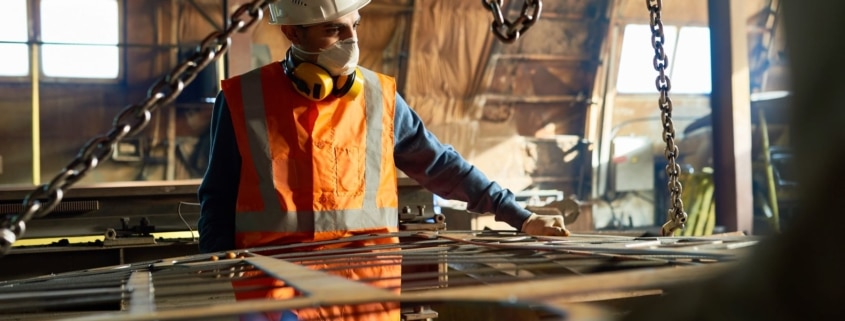Have you considered which perforated metal would be best for your first project? When making this decision, the first thing you should keep in mind is your application. The qualities you pick for your perforated metal will significantly affect how you can use the finished product.
A simple perforated metal sheet can fulfill a variety of architectural roles while being cost-effective, attractive, and functional. There are various applications of perforated metal, including outdoor furniture, balustrades, and acoustic applications. Perforated metal is a vital element in the development of large scale construction projects all over the world, and will continue to be an in-demand choice for the foreseeable future.
Today, we will go over some of the most prevalent uses of perforated sheet metal, and its applications in many of today’s major industries.
What Exactly Is Perforated Sheet Metal?
Perforated metal, also referred to as perforated screen or perforated sheet, is sheet metal that has been mechanically or manually punched or stamped to generate various shapes, sizes, holes, and patterns using CNC technology or, in some circumstances, laser cutting.
Zinc, titanium, copper, stainless steel, and aluminum are just a few of the metals that are utilized in the perforating metal process. The kind of metals for the perforation process is selected according to their materials, gauge, size, and intended purpose. Some of the shapes that can be employed are hexagonal, slotted, square, and round holes.
Practical Constructive & Architectural Benefits of Perforated Metal
Reduction in Solar Radiation & Sun Shading
Sun rays can enter the room directly through common horizontal constructions dividing loggias and balconies, especially in the morning when the sun rays descend for a shorter period. By distributing the sun’s energy and eliminating excessive sunlight, perforated sheets provide a more comfortable environment.
Additionally, perforated metal shutters can be placed on windows to control radiation from the sun. They drastically alter the facade view by allowing for a changing opening angle when closed or open, thereby managing the quantity of light that can enter your place.
Durability
Since perforated sheet metals are mainly composed of zinc, aluminum, steel, or any alloy combination you can conceive of, the ultimate result will be a long-lasting, hard-to-damage building material. Sheet metals can survive for up to five decades with minimal repair and maintenance once put in a structure.
Using durable materials reduces the long-term cost of repair and replacement. Although alloys and metals are preferable, sheet metals are changeable to have various wall thicknesses. The materials may also assist in mitigating damage caused by impact forces, which could compromise the safety of people inside a building.
Acoustic Performance
Perforated metal sheets with a high open area can effectively reduce noise in an environment and provide a pleasant experience. They can also be engineered to enable sound to travel through quickly, allowing them to be used as speaker grilles to safeguard speakers from damage without affecting the sound they produce. Perforated metal noise barriers constructed of aluminum are also employed to absorb and soften noise on highways and near rail tracks.
Energy Efficiency
Perforated metal can help architects reduce internal heat buildup from the sun by balancing light and ventilation. HVAC systems consume less energy because heat is deflected, resulting in a more consistent interior temperature. As a screening feature, perforated metal minimizes the amount of internal illumination required.
The Flexibility of Perforated Sheet Metal Design
Perforated metal variants rely on their material usage, thickness, dimensions, and application region. Perforated sheet metals are available in diverse shapes and sizes, including hexagonal holes, slotted holes, club-shaped holes, square holes, round holes, and other decorative forms. Metal sheets are available in architectural patterns that help with ventilation and contribute aesthetic appeal to buildings.
The Artistic Potential of Perforated Metal Imaging
An increasing number of artists are discovering the potential of perforated metal and its numerous advantages for artistic applications. Because of the variety of metal materials, hole patterns, and thinnest metal profiles, it can be molded into a wide range of forms and shapes. When particularly in comparison to solid metal components, perforated metal allows light to pass through, generating delicate and one-of-a-kind effects depending on the perforation pattern selected.
At MetalTech Global, we can custom-create functional 2D pixelated artwork in even the most intricate colors and patterns, thanks to cutting-edge production technology and extensive creative skills. Aside from that, we only employ the best semi-precious metals in the development of the metal artwork, making it the ideal artistic material for perforated metal art and sculptures for any building.
Why You Should Rely on MetalTech Global
Building materials must be exactly suited to their intended purpose and physical environment, as well as your budget and design specifications.
MetalTech Global is able to create custom perforated patterns and shapes with our millimeter accurate CNC machine and other latest fabrication technology. With these tools, our architect support staff can realize an unlimited variety of folded and perforated panel designs.
We produce custom soffit systems, wall screens, cassettes, and panel inserts with any of our architectural metals. Perforation provides architects a way to create unique designs without restraint. Choose one of our standard patterns or customize a pattern specific for your design.
Our team takes a personalized approach to provide you with custom alternatives that are tailored to your specific requirements. We can make perforated plates, sheets, panels, and coils to your exact specifications.
Contact us today for architectural metals, coils, panels, metal fabrication and cutting, folding, and more!

